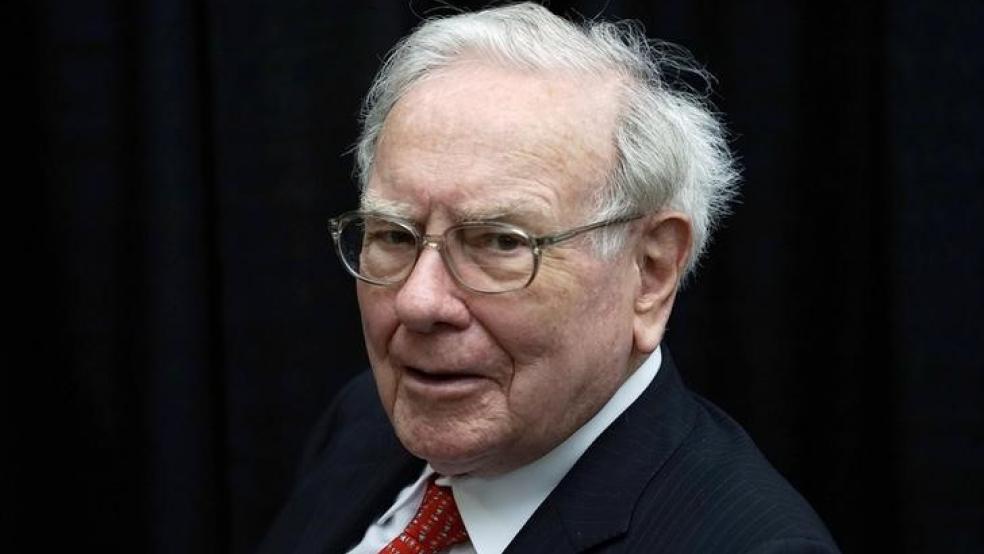Warren Buffett said on Saturday that Berkshire Hathaway Inc is poised to do well no matter who wins the White House in November, and the billionaire investor defended the performance and tactics of the conglomerate's several large investments.
Buffett presided over his 51st Berkshire annual meeting in Omaha, Nebraska, where he and Vice Chairman Charlie Munger fielded five hours of questions on such matters as Coca-Cola's sugary drinks, lower shipping volumes on the BNSF railroad, risks from derivatives, and who might succeed Buffett as chief executive.
Related: Four Reasons Apple’s Earnings Miss Is Such a Big Deal
Buffett, a staunch supporter of Democrat Hillary Clinton for president, was asked about the regulatory impact on Berkshire if Republican front-runner Donald Trump wins the 2016 U.S. presidential election.
"That won't be the main problem," he said to audience laughter.
"If either Donald Trump or Hillary Clinton becomes president, and one of them is very likely to be, I think Berkshire will continue to do fine."
Because the meeting fell early this year, Berkshire also released only preliminary first-quarter results rather than full results, which will come out on May 6.
Berkshire said net income probably rose 8 percent, helped by a gain from the swap of Procter & Gamble Co stock for the Duracell battery business. Operating profit probably fell 12 percent, however. Buffett said BNSF was hurt by declining oil prices and coal shipments, while hailstorms caused losses in Berkshire insurance units.
Related: Target-Date Fund Investing: 5 Ways You’re Doing It Wrong
"Railroad carloading throughout the industry - all of the major railroads - were down significantly in the first quarter, and probably almost certainly will continue to be down for the balance of the year," Buffett said.
Berkshire owns close to 90 businesses in energy, insurance, manufacturing, railroad, retail and other sectors, and invests well over $100 billion in stocks.
COKE IS STILL IT
The meeting filled a downtown arena and overflow rooms, and shareholders could buy products made by Berkshire units at deep discounts in an exhibit hall.
Buffett suggested that 40,000 people may have shown up for his "Woodstock for Capitalists," close to last year's record, though the meeting was streamed online for the first time.
At the meeting, Buffett and Munger fielded dozens of questions from shareholders, analysts and journalists. A shareholder proposal for more disclosures on the risks to Berkshire on climate change was overwhelmingly rejected.
Buffett parried concerns raised by a shareholder, and previously by hedge fund manager William Ackman, that Berkshire promotes bad health through its roughly 9-percent stake in Coca-Cola Co. Buffett, who consumes 700 calories of Coke a day, said it seemed wrong to blame calories alone for rising obesity levels.
"I elect to get my 2,600 or 2,700 calories a day from things that make me feel good when I eat them," he said, including the Cherry Coke and See's peanut brittle he consumed during the meeting. "That's my sole test."
Related: Investor Alert: How to See Through Corporate Earnings Smoke and Mirrors
Buffett also renewed his defense of Brazilian private equity firm 3G Capital, which with Berkshire has a controlling stake in food company Kraft Heinz Co, where it has built on its reputation as a ruthless cost-cutter.
Berkshire is seen as a friendlier owner, but Buffett said 3G's cuts have been "extremely intelligent," and did not appear a threat to Kraft Heinz's ability to produce packaged goods.
Buffett also defended efforts of Berkshire's NV Energy unit to persuade Nevada regulators to reduce subsidies for homeowners there who use solar power, prompting Elon Musk's SolarCity Corp to say it would cease activity there.
"Ninety-nine percent of our consumers were being asked to subsidize the one percent that had solar units," Buffett said. "I personally think that if society is the one that's benefiting from the reduction of greenhouse gasses, that society should pick up the tab."
Buffett also emphasized his worry that derivatives could cause major risks for most of the world's largest banks if markets were disrupted.
"It is still a potential time bomb," he said, but added that he was "not in the least troubled" by Berkshire's big stakes in Wells Fargo & Co and Bank of America Corp.
Related: The End of the Great American Oil Boom
Buffett also said Geico has been hurt because falling oil prices led to more driving, more accidents and more loss claims, but said he did not "necessarily see the same trends this year."
He also said there are no "tea leaves" in the recent announcement that the next chief of the General Re reinsurance unit will report to Buffett's insurance lieutenant Ajit Jain, not to Buffett. Some investors believe Jain is a top candidate to succeed Buffett as Berkshire's chief executive.
EARLY WAKE-UP
Buffett also said Mark Donegan, chief executive of Precision Castparts, which Berkshire bought in January for $32 billion, may now fare even better now that his company has the support from Berkshire's deep well of capital.
"I would almost rank Mark as one of a kind," Buffett said, before joking: "If he needs capital, he's got my 800 number."
Shareholders at the meeting included hundreds who waited hours in a rainstorm before doors opened at 6:20 a.m., 40 minutes early.
"I wanted to make sure I got a good seat," said Kim Baumler, an office manager for a wealth management company from Fargo, North Dakota, who said she was at the head of the line at 10:30 p.m. Friday night. "My boss is a huge Warren Buffett follower, and I got hooked. I wanted to see what it was all about."
Mark Hughes, a money manager from Ashton, Maryland attending his 25th meeting, said he sees no sign Buffett and Munger are winding down.
"They're 85 and 92, and look as good as they ever did," he said.




